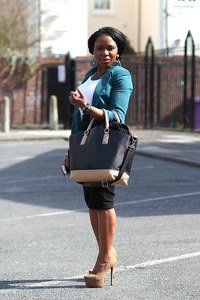I recently had the pleasure to ask Leen Samyn a few questions, which she agreed to take some time off her busy schedule to answer them.
Leen Samyn is such a humble, friendly and down to earth person, she made me feel at ease communicating with her.
Check out her latest collection here. Thanks Leen for agreeing to take part in the Q&A interview.
1. Briefly introduce yourself. (Your personal background)
LS: My name is Leen Samyn, born in Belgium in 1977, curently living in Tanzania where I have a shoe designing company.

2. When did you start designing, did you go to a designing school?
LS: Since an early childhood I have always been fascinated by colours and art. At the age of 8 I already started attending an Art Academy to draw and paint. Afterwards I pursued a degree in Fine Arts. I graduated from The Royal Academy of Fine Arts in Antwerp, Belgium in 2001 and have a Masters Degree. After graduation I worked as a costume designer and stylist on Belgian Films. In 2006 I moved to Tanzania, East Africa, where I found the inspiration for my first sandal collection.
3. Do you only design sandals or are there other things that you design?
LS: At the moment I only design sandals however in the future I am looking to expand my product line.
4. Where do you get design ideas/inspiration from?
LS: I was inspired by the freedom and beauty of the African culture and landscape and specifically the colorful beadwork of the local Maasai Tribe. With this in mind, I have developed The Morani sandal, which means “Warrior” in the Maasai language. I am lucky to live in a place where I can draw endless inspiration from my physical surroundings as well as the endlessly diverse people and culture.

5. What makes your designs/collection unique from other competing brands?
LS: The sandal is completely hand crafted and hand beaded which makes it very unique. The beadwork and finishing is done by Maasai women’s groups in villages close to Arusha. The aim of the business is to educate and create opportunities for Tanzanian women and show them that it is possible to create designs of sufficient quality and originality for the international market using basic locally available materials. The social awareness of the brand and products contribute to their uniqueness.
6. Do you design sandals/shoes for men or women or both? Why?
LS: The current collection is solely for women however in the future I am considering developing a men’s collection as well.
7. How do you find the shoe/fashion/design industry in Tanzania and Africa? Is your work known worldwide?
LS: East Africa has an incredible pool of talent when it comes to design. What impresses me most is the fearless fusion of Western style with local colour and flair. On the other hand, what is lacking is knowledge of the quality standards required to be competitive internationally as well as the confidence to reach out to overseas markets. As a result, very few East African brands are available worldwide. I have sold in Belgium and am currently selling in the US, Australia, South Africa, Denmark, Spain, Uganda, Kenya and Tanzania.

8. Who is your most influential shoe designer?
LS: My favorite shoe designers are Martin Margiela, A.F. VandeVorst, See By Chloe to name a few.
9. Are your designs available to buy online? (You can provide a website)
LS: The sandals are available to buy online, to view the full collection 12 different designs, view my website www.leensamyn.com and to order you can send an email to info@leensamyn.com as the webshop is under construction.

10. Where do you see Leen Samyn designs in 5 years?
LS: Currently I am working on a second collection which will incorporate different materials and is inspired by a different East African tribe. In 5 years I plan to expand my product line while maintaining my commitment to working with locally available materials and local people and of course selling in many more countries.
11. What advice do you have for young people who want to be shoe/sandal designers?
LS: Be confident! Believe in your own creativity and design skills and to know that with a bit of hard work and resourcefulness it is possible to create top quality shoes and sandals anywhere in the world!
12. ‘Asante sana’ that is swahili and it means Thank you
LS: ‘Karibu sana’ Your welcome
Photography credits to Anoop Singh.


